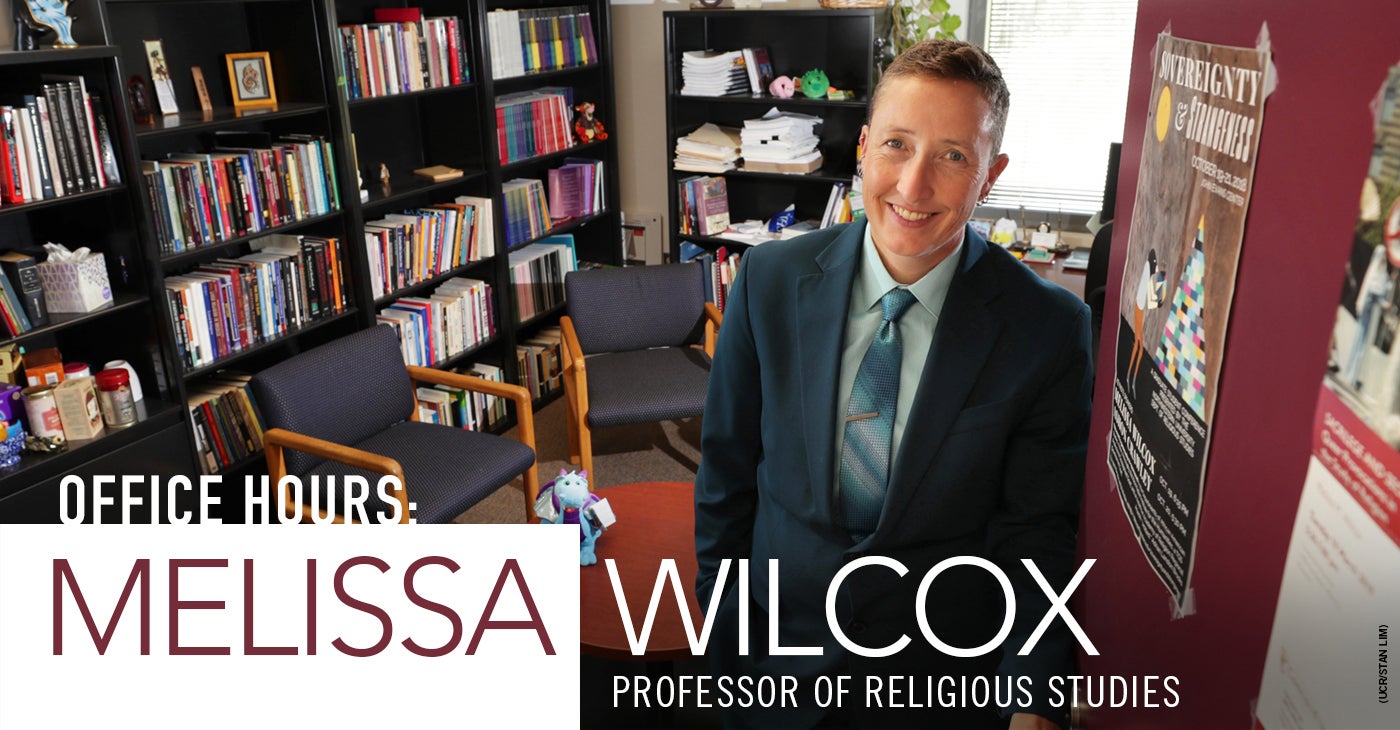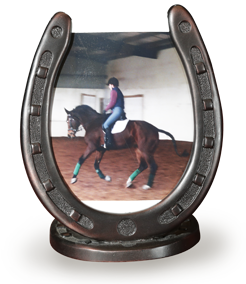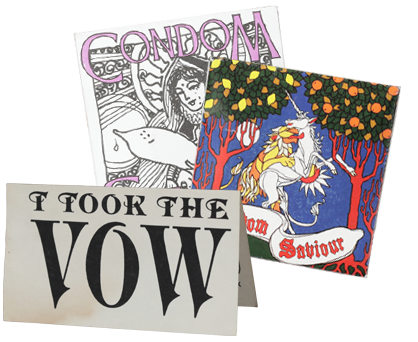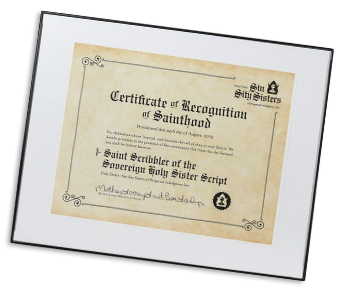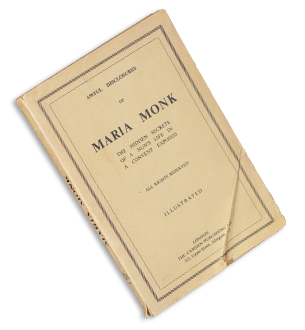Spirituality comes in many forms for this religious studies scholar.
By Jessica Weber
With a brightly colored stuffed dragon atop a small table surrounded by several chairs and a plush brown armchair in the corner, Melissa Wilcox’s office looks more like a cozy meeting room than a typical workspace. Sometimes, it functions as exactly that.
“Occasionally, if I have a graduate class that gets really small, we’ll just meet here,” said Wilcox, a professor of religious studies and the department’s chair. “I have coffee and tea, and I’ve been doing that for students for years.”
Wilcox, 47, joined UC Riverside in 2016 as the Holstein Family and Community Chair of Religious Studies. As a scholar of religions in the U.S., her work focuses primarily on queer and transgender studies, and the ways in which gender and sexuality intersect with religion. Much like her inviting office space — a poster sporting a collage of symbols representing various religions, queer identities, and equal rights groups hangs next to the door — her research espouses openness and inclusion.
Religion had not always been of interest to Wilcox, however. In fact, for much of her life, she had a strong aversion to it. Before becoming an academic, she spent over a decade in the equestrian field, teaching riding and receiving her trainer’s credentials from The British Horse Society. She received a bachelor’s degree in biology from Stanford University, intending to become a veterinarian, but changed course after a class on early Christianity piqued her interest. She went on to earn a master’s degree in women’s studies in religion from Claremont Graduate University and a doctorate in religious studies from UC Santa Barbara.
Wilcox credits an ethnographic methods class she took as a graduate student with homing her interest in religion as it relates to the LGBTQ community. Needing to identify a group that met weekly as part of her research, she begrudgingly decided upon a nearby LGBT church as her field site to practice the methods learned in class.
“I was totally one of those queer people who’s like, ‘Why are you having anything to do with a religion that hates you?’” she said. “The first time I went, I saw a lesbian couple taking communion together, and I totally burst into tears. The fact that they can go up and take communion together and be blessed as a couple by a minister is incredible, and it was all over. I was like, ‘That’s what I’m writing my dissertation on.’”
Wilcox’s latest book, “Queer Nuns: Religion, Activism, and Serious Parody,” was published in May 2018. It chronicles the history of the Sisters of Perpetual Indulgence — an international, religiously unaffiliated order of self-declared queer nuns that originated in San Francisco in 1979. Having grown up in the Bay Area suburb of Orinda, Wilcox was aware of the sisters early on and has been interested in them for most of her career. Incorporating elements of drag with religious iconography, these sisters of all sexualities and gender identities both emulate and parody Roman Catholic traditions in a playful, campy form of activism with the very serious goal of promoting sexual health and destigmatizing queer and other marginalized communities.
Outside her research, Wilcox has maintained a love of horses. She owns and co-owns several horses and actively competes in dressage — a highly skilled sport where horse and rider perform intricate movements based on cavalry exercises.
Wilcox, like much of her family, also has a background in music. Her father, a former professor at UC Berkeley, sang with the San Francisco Opera Chorus; her mother, a former lecturer in psychology at UC Berkeley and UC Davis, taught piano; and her brother is a jazz pianist and composer. Wilcox herself is a trained lyric soprano, and both she and her partner sing with a queer social justice chorus in Long Beach.
Wilcox is now focusing her research on spirituality in queer and transgender BDSM communities. Her goal is to encourage religious studies academics to view the intersections of religion, queerness, and transness as valid forms of religious expression.
“I think the field demands a really radical openness to what people are telling us about their experiences,” Wilcox said.
Horse riding photo
Wilcox first became interested in horse riding as a child through the Girl Scouts and has ridden ever since. This photo is of Wilcox riding her horse, Diamond, over a decade ago. She had intended to compete with Diamond only to discover the horse suffered from a serious developmental joint disorder. Instead, Diamond became a broodmare and Wilcox now competes with one of her offspring, a mare named Lily, in dressage competitions.
Microbe plush toys
While visiting a house of the Sisters of Perpetual Indulgence in London, one of the nuns politely asked Wilcox if she could give her chlamydia and syphilis. “I knew the Sisters of Perpetual Indulgence well enough by then to just respond, ‘Why, of course,’ and just wait to see what the punchline was,” she said. “So, she reached into her purse and pulled out these two little plush toys.” The sister used these toys for her work in sex education, Wilcox said.
Prayer card and condom packets
Shortly after the founding of the Sisters of Perpetual Indulgence, AIDS began appearing in the queer communities of San Francisco, and sex education has been a focus of the sisters ever since. This prayer card, handed out during what the nuns called “Condom Savior Mass,” includes a vow to protect your life and the lives of your partners by using protection. “Most churches were still homophobic at the time,” Wilcox said. “They were getting told AIDS is punishment for your sins, so this was a much more compassionate, in tune with the community approach to salvation.” The sisters still pass out condom packets, along with other educational material and supplies. These packets were designed by the order’s Seattle house.
Certificate of sainthood
People who have dedicated time and energy to the Sisters of Perpetual Indulgence without becoming a formal member are often recognized with sainthood. Wilcox was sainted by the Las Vegas house, which she said came much to her surprise. During the ceremony, Wilcox had to produce three miracles. “You have to produce fire, you have to walk on water, and you have to be in two places at the same time,” she said. “So, they handed me a lighter, they poured some water on the floor, and then they handed me a mirror.”
“Awful Disclosures of Maria Monk”
One of Wilcox’s favorite possessions is this copy of “Awful Disclosures of Maria Monk,” a famous piece of anti-Catholic propaganda published in the U.S. in the 19th century. Ghostwritten by Protestant ministers, the book claims to be a tell-all autobiography by a woman named Maria Monk who escaped rampant abuse from Catholic priests while in a Montreal convent. “It tells all kinds of really outrageous stories of the horrible things that were supposedly going on in this convent — so outrageous that many of them are unbelievable,” she said. “When I use this book to show students how easy it is to fall for anti-religious propaganda, I have to choose carefully to find stuff they’ll actually fall for, because some of it is really over the top.”
